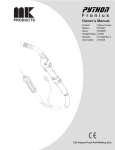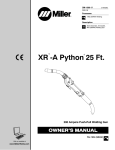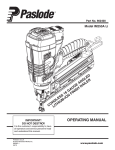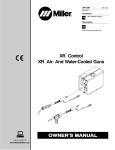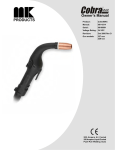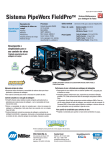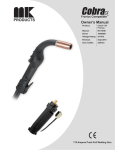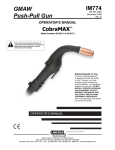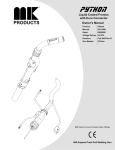Download Miller XR Python Owner`s manual
Transcript
OM-1500-17 218022A January 2004 Processes MIG (GMAW) Welding Description Semi Automatic, Air Cooled, MIG (GMAW) Welding Gun XR™ Python® 25 Ft. 200 Ampere Push-Pull Welding Gun Visit our website at www.MillerWelds.com OWNER'S MANUAL From Miller to You Thank you and congratulations on choosing Miller. Now you can get the job done and get it done right. We know you don’t have time to do it any other way. That’s why when Niels Miller first started building arc welders in 1929, he made sure his products offered long-lasting value and superior quality. Like you, his customers couldn’t afford anything less. Miller products had to be more than the best they could be. They had to be the best you could buy. Today, the people that build and sell Miller products continue the tradition. They’re just as committed to providing equipment and service that meets the high standards of quality and value established in 1929. This Owner’s Manual is designed to help you get the most out of your Miller products. Please take time to read the Safety precautions. They will help you protect yourself against potential hazards on the worksite. We’ve made installation and operation quick and easy. With Miller you can count on years of reliable service with proper maintenance. And if for some reason the unit needs repair, there’s a Troubleshooting section that will help you figure out what the problem is. The Miller is the first welding parts list will then help you to decide the equipment manufacturer in exact part you may need to fix the problem. the U.S.A. to be registered to the ISO 9001:2000 Quality Warranty and service information for your System Standard. particular model are also provided. Miller offers a Technical Manual which provides more detailed service and parts information for your unit. To obtain a Technical Manual, contact your local distributor. Your distributor can also supply you with Welding Process Manuals such as SMAW, GTAW, GMAW, and GMAW-P. Miller Electric manufactures a full line of welders and welding related equipment. For information on other quality Miller products, contact your local Miller distributor to receive the latest full line catalog orindividual catalog sheets. To locate your nearest distributor or service agency call 1-800-4-A-Miller, or visit us at www.MillerWelds.com on the web. Table of Contents SECTION 1 - Safety Precautions - Read Before Using ......................................... i Symbol Usage................................................................................................... i Arc Welding Hazards ........................................................................................ i Additional Symbols For Installation, Operation and Maintenance ................... ii Principle Safety Standards.............................................................................. iv EMF Information ............................................................................................. iv SECTION 2 - Definitions ....................................................................................... v Warning Label .................................................................................................. v Rating Label for CE Products ......................................................................... vi Symbols ..........................................................................................................vii Owners Damage Record ............................................................................... viii SECTION 3 - Installation ....................................................................................... 1 Technical Specifications ................................................................................... 1 Support Equipment Required........................................................................... 1 Coolant Recommendations.............................................................................. 1 Gun Lead Connections .................................................................................... 1 SECTION 4 - Operation ....................................................................................... 1 General ............................................................................................................ 2 Controls and Settings....................................................................................... 2 Trigger Adjustment ........................................................................................... 2 Drive Roll and Idler Rolls ................................................................................. 2 SECTION 5 - Accessories ..................................................................................... 3 Insulated Grooved Drive Roll Kits .................................................................... 3 Replacement Kits ............................................................................................. 4 Conduits ........................................................................................................... 4 Snake Skins ..................................................................................................... 4 Contact Tips ..................................................................................................... 4 Diffusers ........................................................................................................... 4 Nozzles ............................................................................................................ 4 Barrel................................................................................................................ 4 SECTION 6 - Maintenance.................................................................................... 5 Periodic Maintenance ...................................................................................... 5 Testing The Gun............................................................................................... 5 SECTION 7 - Recommended Spare Parts List ..................................................... 6 SECTION 8 - Troubleshooting............................................................................... 6 Troubleshooting Guide..................................................................................... 6 Troubleshooting Table ...................................................................................... 7 SECTION 9 - Appendices ..................................................................................... 8 Mechanical / Parts Lists ................................................................................... 9 Electrical / Connector Pinout.......................................................................... 15 Safety .................................................................................................................. 16 Warranty .............................................................................................................. 18 Declaration of Conformity for European Community (CE) Products Note This information is provided for units with CE certification (see rating label on unit). MK MillerProducts, Electric Mfg.Inc. Co. Manufacturer’s Name: 1635 W.Armstrong Spencer Street 16882 Ave. Appleton, 54914 USA Irvine, CAWI92606 Manufacturer’s Address: Declares that the product: ® XR-Control Python conforms to the following Directives and Standards: Directives Low Voltage Directive: 73/23/EEC Electromagnetic Compatibility (EMC) Directive: 89/336/EEC Machinery Directives: 89/392/EEC, 91/368/EEC, 93/C 133/04, 93/68/EEC Standards Arc Welding Equipment Part I: Welding Power Sources: IEC 60974-1 (September 1998 – Second Edition) Arc Welding Equipment: Wirefeed Systems: IEC 974-5 (September 1997 – Draft Revision) Degrees of Protection Provided By Enclosures (IP Code): IEC 529:1989 (November 1989 - First Edition) Insulation Coordination For Equipment With Low-Voltage Systems: Part I: Principles, Requirements and Tests: IEC 664-1: 1992 (October 1992 – First Edition) Electromagnetic Compatibility, (EMC): EN 50199 (August 1995) Torches And Guns For Arc Welding, EN 50078 European Contact: Telephone: Fax: dec_con1_11/02 Mr. Danilo Fedolfi, Managing Director ITW WELDING PRODUCTS ITALY S.r.l. Via Privata Iseo 6/E 20098 San Giuliano Milanese, Italy 39(02)98290-1 39(02)98290–203 SECTION 1 – SAFETY PRECAUTIONS - READ BEFORE USING som _nd_7/02 1-1. Symbol Usage Means Warning! Watch Out! There are possible hazards with this procedure! The possible hazards are shown in the adjoining symbols. This group of symbols means Warning! Watch Out! possible ELECTRIC SHOCK, MOVING PARTS, and HOT PARTS hazards. Consult symbols and related instructions below for necessary actions to avoid the hazards. Marks a special safety message. Means “Note”; not safety related. 1-2. Arc Welding Hazards The symbols shown below are used throughout this manual to call attention to and identify possible hazards. When you see the symbol, watch out, and follow the related instructions to avoid the hazard. The safety information given below is only a summary of the more complete safety information found in the Safety Standards listed in Section 1-4. Read and follow all Safety Standards. If earth grounding of the workpiece is required, ground it directly with a separate cable. Only qualified persons should install, operate, maintain, and repair this unit. Wear a safety harness if working above floor level. During operation, keep everybody, especially children, away. Clamp work cable with good metal-to-metal contact to workpiece or worktable as near the weld as practical. ELECTRIC SHOCK can kill. Touching live electrical parts can cause fatal shocks or severe burns. The electrode and work circuit is electrically live whenever the output is on. The input power circuit and machine internal circuits are also live when power is on. In semiautomatic or automatic wire welding, the wire, wire reel, drive roll housing, and all metal parts touching the welding wire are electrically live. Incorrectly installed or improperly grounded equipment is a hazard. Do not touch electrode if you are in contact with the work, ground, or another electrode from a different machine. Use only well-maintained equipment. Repair or replace damaged parts at once. Maintain unit according to manual. Keep all panels and covers securely in place. Insulate work clamp when not connected to workpiece to prevent contact with any metal object. Do not connect more than one electrode or work cable to any single weld output terminal. SIGNIFICANT DC VOLTAGE exists after removal of input power on inverters. Turn Off inverter, disconnect input power, and discharge input capacitors according to instructions in Maintenance Section before touching any parts. Do not touch live electrical parts. Wear dry, hole-free insulating gloves and body protection. Insulate yourself from work and ground using dry insulating mats or covers big enough to prevent any physical contact with the work or ground. Do not use AC output in damp areas, if movement is confined, or if there is a danger of falling. FUMES AND GASES can be hazardous. Welding produces fumes and gases. Breathing these fumes and gases can be hazardous to your health. Use AC output ONLY if required for the welding process. Keep your head out of the fumes. Do not breathe the fumes. If AC output is required, use remote output control if present on unit. If inside, ventilate the area and/or use exhaust at the arc to remove welding fumes and gases. Disconnect input power or stop engine before installing or servicing this equipment. Lockout/tagout input power according to OSHA 29 CFR 1910.147 (see Safety Standards). Properly install and ground this equipment according to its Owner’s Manual and national, state, and local codes. If ventilation is poor, use an approved air-supplied respirator. Always verify the supply ground – check and be sure that input power cord ground wire is properly connected to ground terminal in disconnect box or that cord plug is connected to a properly grounded receptacle outlet. When making input connections, attach proper grounding conductor first – double-check connections. Frequently inspect input power cord for damage or bare wiring – replace cord immediately if damaged – bare wiring can kill. Turn off all equipment when not in use. Do not use worn, damaged, undersized, or poorly spliced cables. Do not drape cables over your body. Read the Material Safety Data Sheets (MSDSs) and the manufacturer’s instructions for metals, consumables, coatings, cleaners, and degreasers. Work in a confined space only if it is well ventilated, or while wearing an air-supplied respirator. Always have a trained watchperson nearby. Welding fumes and gases can displace air and lower the oxygen level causing injury or death. Be sure the breathing air is safe. Do not weld in locations near degreasing, cleaning, or spraying operations. The heat and rays of the arc can react with vapors to form highly toxic and irritating gases. Do not weld on coated metals, such as galvanized, lead, or cadmium plated steel, unless the coating is removed from the weld area, the area is well ventilated, and if necessary, while wearing an air-supplied respirator. The coatings and any metals containing these elements can give off toxic fumes if welded. OM-1594 Page 1 XR™ Python® Owner's Manual Page i ARC RAYS can burn eyes and skin. Arc rays from the welding process produce intense visible and invisible (ultraviolet and infrared) rays that can burn eyes and skin. Sparks fly off from the weld. Wear a welding helmet fitted with a proper shade of filter to protect your face and eyes when welding or watching (see ANSI Z49.1 and Z87.1 listed in Safety Standards). Wear approved safety glasses with side shields under your helmet. Use protective screens or barriers to protect others from flash and glare; warn others not to watch the arc. Wear protective clothing made from durable, flame-resistant material (leather and wool) and foot protection. BUILDUP OF GAS can injure or kill. Shut off shielding gas supply when not in use. Always ventilate confined spaces or use approved air-supplied respirator. HOT PARTS can cause severe burns. Do not touch hot parts bare handed. Allow cooling period before working on gun or torch. MAGNETIC FIELDS can affect pacemakers. WELDING can cause fire or explosion. Welding on closed containers, such as tanks, drums, or pipes, can cause them to blow up. Sparks can fly off from the welding arc. The flying sparks, hot workpiece, and hot equipment can cause fires and burns. Accidental contact of electrode to metal objects can cause sparks, explosion, overheating, or fire. Check and be sure the area is safe before doing any welding. Protect yourself and others from flying sparks and hot metal. Do not weld where flying sparks can strike flammable material. Remove all flammables within 35 ft (10.7 m) of the welding arc. If this is not possible, tightly cover them with approved covers. Be alert that welding sparks and hot materials from welding can easily go through small cracks and openings to adjacent areas. Watch for fire, and keep a fire extinguisher nearby. Be aware that welding on a ceiling, floor, bulkhead, or partition can cause fire on the hidden side. Do not weld on closed containers such as tanks, drums, or pipes, unless they are properly prepared according to AWS F4.1 (see Safety Standards). Connect work cable to the work as close to the welding area as practical to prevent welding current from traveling long, possibly unknown paths and causing electric shock and fire hazards. Do not use welder to thaw frozen pipes. Remove stick electrode from holder or cut off welding wire at contact tip when not in use. Wear oil-free protective garments such as leather gloves, heavy shirt, cuffless trousers, high shoes, and a cap. Remove any combustibles, such as a butane lighter or matches, from your person before doing any welding. FLYING METAL can injure eyes. Welding, chipping, wire brushing, and grinding cause sparks and flying metal. As welds cool, they can throw off slag. Wear approved safety glasses with side shields even under your welding helmet. Pacemaker wearers keep away. Wearers should consult their doctor before going near arc welding, gouging, or spot welding operations. NOISE can damage hearing. Noise from some processes or equipment can damage hearing. Wear approved ear protection if noise level is high. CYLINDERS can explode if damaged. Shielding gas cylinders contain gas under high pressure. If damaged, a cylinder can explode. Since gas cylinders are normally part of the welding process, be sure to treat them carefully. Protect compressed gas cylinders from excessive heat, mechanical shocks, slag, open flames, sparks, and arcs. Install cylinders in an upright position by securing to a stationary support or cylinder rack to prevent falling or tipping. Keep cylinders away from any welding or other electrical circuits. Never drape a welding torch over a gas cylinder. Never allow a welding electrode to touch any cylinder. Never weld on a pressurized cylinder – explosion will result. Use only correct shielding gas cylinders, regulators, hoses, and fittings designed for the specific application; maintain them and associated parts in good condition. Turn face away from valve outlet when opening cylinder valve. Keep protective cap in place over valve except when cylinder is in use or connected for use. Read and follow instructions on compressed gas cylinders, associated equipment, and CGA publication P-1 listed in Safety Standards. OM-1594 Page 2 XR™ Python® Owner's Manual Page ii 1-3. Additional Symbols For Installation, Operation, And Maintenance FIRE OR EXPLOSION hazard. Do not install or place unit on, over, or near combustible surfaces. Do not install unit near flammables. Do not overload building wiring – be sure power supply system is properly sized, rated, and protected to handle this unit. FALLING UNIT can cause injury. Use lifting eye to lift unit only, NOT running gear, gas cylinders, or any other accessories. Use equipment of adequate capacity to lift and support unit. If using lift forks to move unit, be sure forks are long enough to extend beyond opposite side of unit. OVERUSE can cause OVERHEATING Allow cooling period; follow rated duty cycle. Reduce current or reduce duty cycle before starting to weld again. Do not block or filter airflow to unit. MOVING PARTS can cause injury. Keep away from moving parts such as fans. Keep all doors, panels, covers, and guards closed and securely in place. H.F. RADIATION can cause interference. High-frequency (H.F.) can interfere with radio navigation, safety services, computers, and communications equipment. Have only qualified persons familiar with electronic equipment perform this installation. The user is responsible for having a qualified electrician promptly correct any interference problem resulting from the installation. If notified by the FCC about interference, stop using the equipment at once. Have the installation regularly checked and maintained. Keep high-frequency source doors and panels tightly shut, keep spark gaps at correct setting, and use grounding and shielding to minimize the possibility of interference. STATIC (ESD) can damage PC boards. Put on grounded wrist strap BEFORE handling boards or parts. Use proper static-proof bags and boxes to store, move, or ship PC boards. MOVING PARTS can cause injury. Keep away from moving parts. Keep away from pinch points such as drive rolls. WELDING WIRE can cause injury. Do not press gun trigger until instructed to do so. Do not point gun toward any part of the body, other people, or any metal when threading welding wire. ARC WELDING can cause interference. Electromagnetic energy can interfere with sensitive electronic equipment such as computers and computer-driven equipment such as robots. Be sure all equipment in the welding area is electromagnetically compatible. To reduce possible interference, keep weld cables as short as possible, close together, and down low, such as on the floor. Locate welding operation 100 meters from any sensitive electronic equipment. Be sure this welding machine is installed and grounded according to this manual. If interference still occurs, the user must take extra measures such as moving the welding machine, using shielded cables, using line filters, or shielding the work area. OM-1594 Page 3 XR™ Python® Owner's Manual Page iii 1-4. Principal Safety Standards Safety in Welding, Cutting, and Allied Processes, ANSI Standard Z49.1, from American Welding Society, 550 N.W. LeJeune Rd, Miami FL 33126 (phone: 305-443-9353, website: www.aws.org). Boulevard, Rexdale, Ontario, Canada M9W 1R3 (phone: 800–463–6727 or in Toronto 416–747–4044, website: www.csa–international.org). Recommended Safe Practices for the Preparation for Welding and Cutting of Containers and Piping, American Welding Society Standard AWS F4.1, from American Welding Society, 550 N.W. LeJeune Rd, Miami, FL 33126 (phone: 305-443-9353, website: www.aws.org). Practice For Occupational And Educational Eye And Face Protection, ANSI Standard Z87.1, from American National Standards Institute, 11 West 42nd Street, New York, NY 10036–8002 (phone: 212–642–4900, website: www.ansi.org). National Electrical Code, NFPA Standard 70, from National Fire Protection Association, P.O. Box 9101, 1 Battery March Park, Quincy, MA 02269–9101 (phone: 617–770–3000, website: www.nfpa.org and www. sparky.org). Standard for Fire Prevention During Welding, Cutting, and Other Hot Work, NFPA Standard 51B, from National Fire Protection Association, P.O. Box 9101, 1 Battery March Park, Quincy, MA 02269–9101 (phone: 617–770–3000, website: www.nfpa.org and www. sparky.org). Safe Handling of Compressed Gases in Cylinders, CGA Pamphlet P-1, from Compressed Gas Association, 1735 Jefferson Davis Highway, Suite 1004, Arlington, VA 22202–4102 (phone: 703–412–0900, website: www.cganet.com). Code for Safety in Welding and Cutting, CSA Standard W117.2, from Canadian Standards Association, Standards Sales, 178 Rexdale OSHA, Occupational Safety and Health Standards for General Industry, Title 29, Code of Federal Regulations (CFR), Part 1910, Subpart Q, and Part 1926, Subpart J, from U.S. Government Printing Office, Superintendent of Documents, P.O. Box 371954, Pittsburgh, PA 15250 (there are 10 Regional Offices––phone for Region 5, Chicago, is 312–353–2220, website: www.osha.gov). 1-5. EMF Information Considerations About Welding And The Effects Of Low Frequency Electric And Magnetic Fields Welding current, as it flows through welding cables, will cause electromagnetic fields. There has been and still is some concern about such fields. However, after examining more than 500 studies spanning 17 years of research, a special blue ribbon committee of the National Research Council concluded that: “The body of evidence, in the committee’s judgment, has not demonstrated that exposure to powerfrequency electric and magnetic fields is a human-health hazard.” However, studies are still going forth and evidence continues to be examined. Until the final conclusions of the research are reached, you may wish to minimize your exposure to electromagnetic fields when welding or cutting. To reduce magnetic fields in the workplace, use the following procedures: 1. Keep cables close together by twisting or taping them. 2. Arrange cables to one side and away from the operator. 3. Do not coil or drape cables around your body. 4. Keep welding power source and cables as far away from operator as practical. 5. Connect work clamp to workpiece as close to the weld as possible. About Pacemakers: Pacemaker wearers consult your doctor first. If cleared by your doctor, then following the above procedures is recommended. OM-1594 Page 4 XR™ Python® Owner's Manual Page iv SECTION 2 – DEFINITIONS 2-1. Warning Label Definitions A B 1 1.1 2 2.1 3 3.1 4 4.1 1.2 2.2 + 1.3 2.3 3.2 + 5 C 3.3 + + 6 S-178 936 A. Warning! Watch Out! There are possible hazards as shown by the symbols. B. Drive rolls can injure fingers. C. Welding wire and drive parts are at welding voltage during operation – keep hands and metal objects clear. 1 Electric shock can kill. 1.1 Wear dry insulating gloves. Do not touch electrode with bare hand. Do not wear wet or damaged gloves. 1.2 Protect yourself from electric shock by insulating yourself from work and ground. 1.3 Disconnect input plug or power before working on machine. 2 Breathing welding fumes can be hazardous to your health. 2.1 Keep your head out of the fumes. 2.2 Use forced ventilation or local exhaust to remove the fumes. 2.3 Use ventilating fan to remove fumes. 3 Welding sparks can cause explosion or fire. 3.1 Keep flammables away from welding. Don’t weld near flammables. 3.2 Welding sparks can cause fires. Have a fire extinguisher nearby and have a watch person ready to use it. 3.3 Do not weld on drums or any closed containers. 4 Arc rays can burn eyes and injure skin. 4.1 Wear hat and safety glasses. Use ear protection and button shirt collar. Use welding helmet with correct shade of filter. Wear complete body protection. 5 Become trained and read the instructions before working on the machine or welding. 6 Do not remove or paint over (cover) the label. OM-1594 Page 9 XR™ Python® Owner's Manual Page v 1 2 3 Read the Owner’s Manual. Do not overtighten wire spool brake pressure. Tighten only until wire does not overspool from wire supply spool. Do not overtighten drive roll pressure. Tighten only until drive roll will not slip (motor will not stall) on a stationary wire. 2-2. Rating Label For CE Products S/N: 50/60 U1 = 24 V I1 = 5.0 A 1 U2 = 100 V I2 = 400 A 50/60 Hz IP 23 X 100 % ST-178 794-A OM-1594 Page 10 XR™ Python® Owner's Manual Page vi 2-3. Symbols And Definitions Note Some symbols are found only on CE products. A IP X Duty Cycle Alternating Current Hertz Circuit Breaker Wire Feed Jog Output Trigger Gun Press To Set Increase Trigger Hold On Trigger Hold Off Purge Spot Weld Time Percent Run-In Load Voltage Read Instructions Rated Current Line Connection Water (Coolant) Input Fuse Continuous Spot Welding Degree Of Protection Burnback Time I1 V Hz Volts Amperes Primary Current U1 I2 Water (Coolant) Output Primary Voltage U2 SECTION 3 – INTRODUCTION 3-1. Specifications Type of Input Power Welding Power Source Type 24 Volts AC Single-Phase 5 Amperes 50/60 Hertz Constant Voltage (CV) DC For GMAW Or Constant Voltage(CV) / Constant Current (CC) DC For GMAW-P All Need 14-Pin And Contactor Control Wire Feed Speed Range 70 To 875 ipm (1.8 To 22.2 mpm) Wire Diameter Range .030 To .062 in (0.8 To 1.6 mm) Max Spool Capacity: 12 in (305 mm) Welding Circuit Rating All Models: 100% Duty Cycle, 100 Volts; Water-Cooled Models: 400 Amperes, Air-Cooled Models: 200 Amperes Overall Dimensions Weight Length: 21-1/4 in (540 mm) Width: 9-1/2 in (241 mm) 38 lb (17.2 kg) Height: 16 in (406 mm) OM-1594 Page 11 XR™ Python® Owner's Manual Page vii Thank You For selecting a quality product. We want you to take pride in operating this product...as much pride as we have in bringing the product to you! Please Examine Carton and Equipment For Damage Immediately When this equipment is shipped, title passes to the purchaser upon receipt by the carrier. Consequently, claims for material damaged in shipment must be made by the purchaser against the transportation company at the time the shipment is received. Please record your equipment identification information below for future reference. This information can be found on your machine nameplate. Model Name & Number _____________________ Code & Serial Number _____________________ Date of Purchase _____________________ Whenever you request replacements parts for, or information on this equipment always supply the information you have recorded above. Read this Owner’s Manual completely before attempting to use this equipment. Save this manual and keep it handy for quick reference. Pay particular attention to the safety instructions we have provided for your protection. XR™ Python® Owner's Manual Page viii Section 3 Installation Technical Specifications Wire Capacity Aluminum and Cored Wire ........................... .030" - 1/16" (0.8 mm - 1.6 mm) Solid and Hard Wire ..................................... .030" - .045" (0.6 mm - 1.2 mm) Wire Speed (At rated feeder input voltage) .............70 - 875 ipm (22.2 mpm) Duty Cycle - 100% (All ratings are using Argon gas) ............ 200 Amps Peak Shipping Weight (approximate) ...................................... 19.29 lbs. (8.29 Kg) Gun weight (less leads)....................................................... 2.5 lbs. (1.13 Kg) Support Equipment Required • C.V. or C.C. power source of sufficient capacity for your needs. • Regulated gas supply and hoses. • Properly sized power leads from power source to wire feeder and ground. Gun Lead Connections Power Cable A #2 AWG power cable is used on the XR™ Python®. The gun end of the cable has a fitting crimped to the copper cable strands. This fitting is then threaded into the gun body. The cabinet end of the power cable is incorporated into the Power Pin connector. Conduit The XR™ Python® comes standard with a poly-lined conduit, for feeding aluminum wire. The longer fitting with a shallow groove is used on the gun end. A set screw located on top of the gun handle secures the conduit in place. The cabinet end of the conduit is incorporated into the Power Pin connector. Gas Hose The gas hose is pushed over a barbed fitting on the gun body and secured with a plastic tie wrap. The cabinet end of the gas hose is incorporated into the Power Pin connector. Electric Cable A multi-conductor control cable is used on the XR™ Python®. The gun end of the cable is secured with a cable clamp and the wires are connected to the potentiometer, the micro switch, the motor and the gun body mechanically. Slack is left in the electric cable as it exits the back of the gun to prevent cable and/or wire breakage. The cabinet end of the control cable uses a 10Pin, "X" clocked Amphenol connector. Section 4 Operation General The Python® maintains a constant, steady, uniform wire feed speed, regardless of curved or looped wire conduit. The constant push exerted by the slave motor in the cabinet, combined with the pull of the gun motor, XR™ Python® Owner's Manual - Page 1 causes the wire to literally float friction-free through the wire conduit. The 24VDC gun motor is controlled by a three and three-quarter (3 3/4) turn potentiometer in the gun handle. Controls and Settings Potentiometer The laterally-positioned potentiometer is located in the lower end of the handle, providing up to 875 ipm (22.2 mpm) with 3 3/4 turns. Micro Switch The micro switch assembly consists of a normally open micro switch and solder-attached leads. Trigger Sensitivity The amount of trigger level travel can be shortened for a quicker or more responsive action. A more sensitive trigger lever is produced by reducing the gap between the trigger lever and the micro switch lever. By turning-in the trigger sensitivity adjustment screw, it closed the gap between the trigger lever and the micro switch lever. This will enable the operator to increase the sensitivity of the trigger lever. Sensitivity Adjustment With the wire feeder turned on (with or without welding wire loaded), turn the screw in until the micro-switch is activated. Once activated, the gun and wire feeder motors will begin feeding wire. Retract the screw accordingly until the system is deactivated and adjusted to the operators' liking. Drive Roll and Idler Rolls The Python® comes standard with a knurled drive roll and a grooved idler roll, which will handle both steel and aluminum wire with diameters from .030-1/16 inch. Optional insulated V-groove drive rolls are also available for aluminum wire if desired (see optional kits). Drive roll tension is accomplished with a unique spring-loaded pressure screw. The Python® comes from the factory with the pressure adjustment screw preset. NO ADJUSTMENT REQUIRED FOR ANY WIRE SIZE AND ALLOY Drive Roll Installation/Removal Note: Neither of the handles needs to be removed to access the drive or idler rolls. Cam Lever 1. Pull the cam lever away from the idler roll. This will relieve the pressure against the drive roll (as shown in Figure 1). Figure 1 XR™ Python® Owner's Manual - Page 2 2. Align the drive roll removal tool (P/N 931-0100) over the flats of the drive roll (as shown in Figure 2). Hold the gun with one hand or on a table top, with the other hand give the removal tool a quick snapturn in the CLOCKWISE DIRECTION. 3. Once the drive roll is loose, continue to spin drive roll in the clockwise direction to remove the drive roll from the gun. Figure 2 4. Install a new drive roll on the left-hand threaded shaft. The drive roll will self-tighten when it is feeding wire. Idler Roll Installation and Removal (Reference Figure 3) 1. Using a slot type screwdriver, loosen idler screw, taking care not to lose lock washer under idler roll. 2. Insert new idler roll and lock washer onto screw, insuring that idler groove is toward top and lock washer is beneath. 3. Tighten screw until tight. Figure 3 NOTE: Lock washer must be under idler roll or it will not turn freely. Section 5 Options and Accessories Insulated Drive Roll Kits Used to prevent preheating of the wire which may soften it and clog the liner. This picking up of current at the drive rolls rather than at the contact tip is usually not a problem unless using too large of a contact tip or excessively oxidized aluminum wire. MK P/N Miller P/N Insulated Groove Drive Roll Kit....................... 005-0640............215677 For .030" (0.8 mm) dia. aluminum wire. Includes insulated drive roll P/N 511-0102 and idler roll assy. P/N 003-1870. Insulated Groove Drive Roll Kit....................... 005-0641............215678 For .035" (0.9 mm) dia. aluminum wire. Includes insulated drive roll P/N 511-0103 and idler roll assy. P/N 003-1870. Insulated Groove Drive Roll Kit....................... 005-0642.............. N/A For .040" (1.0 mm) dia. aluminum wire. Includes insulated drive roll P/N 511-0104 and idler roll assy. P/N 003-1870. Insulated Groove Drive Roll Kit....................... 005-0643............215687 For .045" (1.2 mm) dia. aluminum wire. Includes insulated drive roll P/N 511-0105 and idler roll assy. P/N 003-1870. Insulated Groove Drive Roll Kit....................... 005-0644............215684 For .062" (1.6 mm) dia. aluminum wire. Includes insulated drive roll P/N 511-0106 and idler roll assy. P/N 003-1870. XR™ Python® Owner's Manual - Page 3 Replacement Kits Handle Kit......................................................................................... 005-0699 Left and right handles, screws and drive roll door, as a replacement for all Python® guns. Trigger Kit......................................................................................... 005-0694 Trigger adjustment kit includes a spring and sensitivity adjustment screw replacement for all Python® guns. Micro Switch Kit............................................................................... 005-0701 Replacement micro switch assembly for all Python® guns. Potentiometer Kit............................................................................. 005-0695 Replacement potentiometer assembly for all Python® guns. Conduit Flat spiral steel conduit for steel & cored wire ................................... 615-0216 Snake Skins A Snake Skin protective cover is standard on the XR™ Python®. You may order spare replacement covers to protect the lead assy of the gun when the original becomes damaged or worn. It can easily be replaced in the field by means of a hook and loop type fastener. Replacement Snake Skin .................................................................. 931-0122 Contact Tips The XR™ Python® comes standard with genuine Miller FasTip Contact Tips. For a complete listing of available contact tips for the XR™ Python®, please reference the XR™ Python® Barrel breakdown and Parts List later in this manual. Diffuser The XR™ Python® comes standard with a genuine Miller Gas Diffuser. For a complete listing of available diffusers for the XR™ Python®, please reference the XR™ Python® Barrel breakdown and Parts List later in this manual. Nozzle The XR™ Python® comes standard with a genuine Miller Gas Nozzle. For a complete listing of available nozzles for the XR™ Python®, please reference the XR™ Python® Barrel breakdown and Parts List later in this manual. Barrel The XR™ Python® comes standard with a 60˚ curved barrel. The barrel assembly locks to the Python® body using the patented EZ Lock™ system. Barrel Removal and Installation To remove the barrel assembly, loosen the patented EZ Lock™ taper lock nut until it is clear of the threads. Pull barrel out of the gun body. To replace a barrel assembly, push the barrel assembly into the gun body until it stops. To assure proper seating of the barrel, open the drive/idler roll door in the top of the handle. The rear face of the barrel should now be flush with the gun body. Take care not to damage the o-rings when inserting into the body. Tighten taper lock nut assembly firmly so that barrel cannot rotate while welding. Barrel Rotation To rotate a barrel assembly, loosen the patented EZ Lock™ taper lock nut assembly no more than 1 turn. Rotate barrel to the position of your choice and re-tighten taper lock nut assembly firmly so that the barrel cannot rotate. XR™ Python® Owner's Manual - Page 4 WARNING: Do not attempt to weld without the barrel being tightly secured in the gun body, or damage to the barrel or body may result. Barrel Liner The standard Teflon liner in the XR™ Python® barrel is designed for aluminum and other soft wire. A Steel liner is available for steel, cored and other hard wires. Liner Package, Teflon Standard - Aluminum (5 pcs.) ........................ 931-0137 Liner, Spiral Steel - Steel and Hard Wires. ........................................ 615-0338 Section 6 Maintenance Periodic Maintenance Your XR™ Python® is designed to provide years of reliable service. Maintenance of the gun will normally consist of a general cleaning of the wire guide system, including barrels, drive rolls, and conduits at regular intervals. Remove spatter build-up from inside of nozzles with a hardwood stick. The only parts that are subject to normal wear are the conduit, contact tips, nozzles, barrel liners, wire guides, drive and idler rolls. A supply of these parts should be maintained on hand. The number of units in operation and the importance of minimal down time will determine to what extent spare parts should be stocked on hand. See the recommended spare parts list for the most commonly replaced parts. If repairs do become necessary, qualified shop maintenance personnel can easily replace any part. Maintenance Tools Tool Part Number Drive Roll Removal Tool 215676 Reference the table below for suggested Maintenance Tools used with the XR™ Python® welding gun. Testing The Gun Reference the "X" clocked Amphenol diagram on the XR™ Python® electrical diagram for information about pin-outs and locations. Motor Check Remove the connector from the cabinet. Using the Amphenol connector, check the resistance across pins “C” and “B” (motor leads). The resistance across the motor should be between 5 - 10 ohms as the potentiometer is turned. If an open circuit or short exist, check the motor leads and motor independently. Testing the Gun Potentiometer Using the amphenol connector, check the resistance across pin “F” (wiper) and pin “E”. The resistance should vary from 0 - 5K ohms as the potentiometer is turned. XR™ Python® Owner's Manual - Page 5 Check the resistance across pin “F” (wiper) and pin “H”. The resistance should vary from 5K - 0 ohms as the potentiometer is turned. Testing the Micro Switch Using the amphenol connector, check for continuity across pins “D” and “G” when the trigger is pressed. Section 7 Recommended Spare Parts Listed in the table bale is the factory recommendation of the necessary spare parts which should be kept on hand for maintaining proper operation of the XR™ Python® welding gun. Recommended Spare Parts List Qty. Part No. Description 1 615-0008 Conduit 2 005-0694 Trigger Assy Kit 2 005-0695 Potentiometer Assy Kit 1 005-0699 Handle Kit 2 005-0701 Micro-Switch Assy Kit 10 511-0101 Drive Roll 5 005-0686 Idler Roll Kit 2 931-0137 Liner Package - 5 pieces each A/R 206189 Contact Tips A/R 198855 Nozzle A/R 206195 Diffuser This list, in no way, indicates that these parts are more likely to fail or cause equipment damage. This is not an indication of premature failure or defect in manufacture of said parts. Section 8 Troubleshooting Guide To aid in troubleshooting problems with your welding equipment, it is best to understand the basic theory of operation for this Push-Pull System. The slave motor in the feeder runs at a fast, constant speed, but has very low torque. It is always trying to feed more wire than the gun motor wants, and when the motor gets all it wants, it slows the slave motor, preventing a bird’s nest. Because of the low torque produced by the slave motor, a brake system is used to prevent wire overrun rather than tension. The drag adjustment in the feeder is used simply to keep the wire slightly taut, so it will not pull off the spool while feeding wire. The high torque 24VDC gun motor is controlled by a solid state speed control located in the feeder, and a pot located in the gun. The gun motor, potentiometer, and micro switch are connected to the cabinet/control box via a control cable and Amphenol connector. If this cable becomes damaged, a variety of symptoms can occur, depending on which wire(s) break. To test, check each wire for continuity and shorts. Remember, the micro switch in the gun activates both the slave motor and gun motor circuits in the cabinet. Therefore, if the slave motor and brake solenoid operate, but the gun does not, look more toward the gun motor’s 24 V circuits, speed control, control cable, or the gun motor. If nothing operates, look more toward the slave motor’s input, micro switch leads, or micro switch. XR™ Python® Owner's Manual - Page 6 Troubleshooting Table Symptoms No wire feed at gun, feeder not operating, i.e. no slave motor or brake solenoid. No wire feed at gun, feeder operating properly. Wire feeds, but welding wire is not energized. Wire feeds erratically. Wire feeds one speed only. Wire walks out of drive rolls. Cause Circuit breaker in feeder/ control box open. Remedy Reset. Micro-switch defective/not Replace switch. Check being activated. switch for operation. Broken electrical cable. Check micro-switch wires for continuity. Circuit breaker in feeder/ control box open. Check motor leads for short. Reset. Bad potentiometer. Check potentiometer with meter. Broken electrical cable. Check motor and potentiometer wires for continuity. Bad speed control/PCB. See specific feeder/ control box owner's manual for speed control operation. Loose or no cable connections. Check all power connections. Contactor control cable loose or in wrong position. Check power supply owner's manual for location and type of contactor signal required. Welding power source. Check power source. Dirty or worn conduit. Blow out or replace conduit. Wrong size contact tip. See contact tip table. Idler roll stuck. Check for lock washer under idler roll, or replace if damaged. Bad potentiometer. Check with meter. Broken electrical cable. Check potentiometer wires for continuity or short. Bad speed control. See specific feeder/ control owner's manual for speed control operation. Idler roll upside-down. Place groove in idler roll toward top. Rear wire guide missing. Replace wire guide. Consult wire feeder and welding power supply owners manuals for further problem solving solutions. XR™ Python® Owner's Manual - Page 7 Section 9 Appendices Diagrams / Parts List XR™ Python® Parts View ........................................................9 XR™ Python® Bill of Material.................................................10 Python® Front Body Parts View ............................................. 11 XR™ Python® Barrel Parts View............................................12 XR™ Barrel Consumables Listing .........................................13 XR™ Python® Power/Gas Connector Parts View.................. 14 XR™ Python® Electrical/Pinout..............................................15 XR™ Python® Owner's Manual - Page 8 XR™ Python® - 25 Ft. Model 195451 XR™ Python® Owner's Manual - page 9 XR™ Python® Owner's Manual - page 10 Qty 1 1 1 1 1 1 1 1 1 1 4 1 1 1 1 1 6 2 1 2 1 1 9 No. 1 2 3 4 5 6 7 8 9 10 11 12 13 14 15 16 17 18 19 20 21 22 23 328-0012 321-1104 321-0424 320-0084 319-0258 319-0254 303-0096 211-0077 203560 203562 189811 189812 145217 003-2241 003-2240 005-0695 003-2153 005-0701 003-2125 003-2108 005-0694 002-0631 002-0629 Part No. Screw SHC 6-32 x 3/8 Set Screw Mod Set Screw #4-40 X 1/8 SST Screw Button 4-40 X 3/16 ST Screw FH Phil 82 4-40 X 5/8 SST Screw FH Phil 82 4-40 X 3/8 SST O-Ring 2-007 Buna N Motor Spring Retainer Strain Relief Spring Housing, Power Pin Handle - Left Housing, Power Pin Handle - Right Screw, K40 x 12 Power Pin Assy, XR™ Python® Barrel 60º, XR™ Python® Pot Assy Kit Lead Assembly Boot Micro Swx Kit Pot Knob Assy Front Body Assy Trigger Kit Brazed Rear Body Cam Idler Arm Assy Description 46 45 44 43 42 41 40 39 38 37 36 35 34 33 32 31 30 29 28 27 26 25 24 No. 1 A/R A/R A/R A/R 1 1 1 0.30 ft 1 1 1 1 1 1 1 1 1 6 1 1 4 Qty XR™ Python® Parts List 931-0122 835-0011 835-0006 823-0050 823-0029 843-0625 843-0620 751-0020 737-0048 615-0008 552-0225 437-0253 005-0699 435-1585 431-1637 431-1622 431-1591 421-0018 411-0045 338-0153 336-0020 333-0005 Part No. Snake Skin Cable Cover Compound Grease Silicon Lubricant Thread Locking Cmpd Low Str Naolox Compound Control Cable Assy, XR™ Python® Power Cable Assy, XR™ Python® Cap Plug 0.218 ID X 0.50 LG Tube Insulation 9 AWG, Clear Conduit Gas Hose, XR™ Python® Molded Door Handle Kit; includes #23, 30 & 35 Motor Strap Hex Screw 3/8-20 X 3/8 Shoulder Screw 1/8 X 4-40 Wire Guide Dowel Pin 3/32 X 7/8 SST Tie Wrap Screw SHC 1-72 X 3/8 Screw PH Phil 4-40 x 5/16 SST #6 Spring Lock Washer Description Python® Front Body Assembly P/N 003-2108 Python® Front Body Assembly No. Qty. Part Number Description 1 1 003-2083 Output Shaft Assembly 2 1 003-2106 Body Assembly 3 1 325-0206 10-24 x 3/8 PH Screw 4 1 333-0082 # 10 Lock Washer 5 1 419-0092 0.29 x 0.047 x 0.32 Comp. Spring 6 1 421-0525 1/8 x 7/8 SST Dowel Pin 7 1 431-1663 Idler Adjusting Screw 8 1 431-1598 Idler Arm 9 1 511-0001 Idler Wire Feed Assembly 10 1 511-0101 Drive roll XR™ Python® Owner's Manual - page 11 XR™ Python® Barrel Assembly - 60° P/N 003-2240 XR™ Python® 60º Barrel Assembly No. Qty. Part Number Description 1 1 206195* Diffuser, 1/8 Tip Recess 2 1 002-0652 Assy Barrel Bend XR Python 3 1 003-2213 Assy Taper Lock Barrel 4 1 198855* Nozzle, Copper, 5/8" Orifice 5 1 206189* .052 Heavy Duty FasTip 6 4 303-0010 O-Ring, 0.489 ID x 0.629 OD 7 2 303-0094 O-Ring, 0.301 ID x 0.070 WT 8 1 313-0091 Retaining Ring 9 1 261-0157 Barrel Insulator 10 0.66ft. 931-0137 Liner, Teflon Package - 5 pcs. * Standard XR™ Python® Owner's Manual - page 12 XR™ Replacement Consumables Item P/N Description 4 176238 4 176240A NOZZLE, spot inside corner 4 176242A NOZZLE, spot outside corner 4 199610 NOZZLE, screw on brass 1/2" orifice 4 199611 NOZZLE, screw on brass 3/4" orifice straight 4 199612 NOZZLE, screw on brass 3/4" orifice straight heavy duty 4 199613 NOZZLE, screw on brass 5/8" orifice 4 199614 NOZZLE, screw on brass 5/8" orifice heavy duty 4 199615 NOZZLE, screw on copper 1/2" orifice 4 199616 NOZZLE, screw on copper 3/4" orifice straight 4 199617 NOZZLE, screw on copper 3/4" orifice straight heavy duty 4 198855 NOZZLE, screw on copper 5/8" orifice (standard on 300 & 400 amp models) 4 199618 NOZZLE, screw on copper 5/8" orifice (standard on 500 & 600 amp models) 4 207313 NOZZLE, screw on copper 5/8" orifice tapered 15/16 OD 4 209035B NOZZLE, screw on copper 3/8" orifice tapered 4 209036 NOZZLE, screw on copper 1/2" orifice tapered NOZZLES A B NOZZLE, spot flat CONTACT TIPS Standard FasTip Contact Tips - 0.281 OD 5 206177 .035 (0.9 mm)/.030 (0.8 mm) aluminum wire 5 206179 .045 (1.2 mm)/.040 (1.0 mm) aluminum wire 5 206180 .052 (1.3 mm) / 3/64 (1.2 mm) aluminum wire 5 206181 1/16 (1.6 mm) 5 206182 .068 (1.7 mm) or (1.6 mm) aluminum wire 5 206186 .035 (0.9 mm) / .030 (0.8 mm) aluminum wire 5 206187 .040 (1.0 mm) / .035 (0.9 mm) aluminum wire 5 206188 .045 (1.2 mm) / .040 (1.0 mm) aluminum wire 5 206189 .052 (1.3 mm) or 3/64 (1.2 mm) aluminum wire 5 206190 1/16 (1.6 mm) 5 206191 .068 (1.7 mm) or (1.6 mm) aluminum wire Heavy Duty FasTip Contact Tips - 0.312 OD Tapered FasTip Contact Tips 5 209026 .035 (0.9 mm) / .030 (0.8 mm) aluminum wire 5 209027 .040 (1.0 mm) / .035 (0.9 mm) aluminum wire 5 209028 3/64 (1.2 mm) 5 209029 .052 (1.3 mm) 5 209030 1/16 (1.6 mm) GAS DIFFUSERS A B 1 206195 1/8 tip recess - for all standard and heavy duty FasTip contact tips (standard) 1 210664 1/4 tip recess - for all standard and heavy duty FasTip contact tips 1 206196 Flush tip - for standard and heavy duty FasTip contact tips Requires diffuser 209099, used with any standard or heavy duty FasTip contact tip. Requires diffuser 206195, 206196 or 210664, used with any tapered FasTip contact tip. XR™ Python® Owner's Manual - page 13 XR™ Python® Power/Gas Connector P/N 003-2241 XR™ Python® Power/Gas Connector No. Qty. Part Number Description 1 0.45ft 615-0351 2 2 602172 3 1 321-1104 4 1 202513 Gas Hose Fitting 5 1 202216 Outlet Wire Guide 6 1 193896 Power Pin Assy 7 1 431-1743 8 1 141694 Set Screw, 5/16-18 x 0.37 9 1 137495 Power Weld Fitting 10 2 079974 O-Ring, 0.5 ID Teflon Tube Liner Set Screw, 10-32 x 18 Set Screw, Mod Conduit Power Gas Connector, MODIFIED XR™ Python® Owner's Manual - page 14 XR™ Python® Electrical Schematic/ Connector Pinout Polarizing Key "X" Clocked Amphenol Connector Viewed from back of connector XR™ Python® Owner's Manual - page 15 Safety Warnings XR™ Python® Owner's Manual - page 16 XR™ Python® Owner's Manual - page 17 3 YEAR LIMITED WARRANTY Effective February 1, 2003 Warranty Questions? Call 1-800-4-A-MILLER for your local Miller distributor. Your distributor also gives you... Service You always get the fast, reliable response you need. Most replacement parts can be in your hands in 24 hours. Support Need fast answers to the tough welding questions? Contact your distributor. The expertise of the distributor and Miller is there to help you, every step of the way. This warranty supersedes all previous MK Products warranties and is exclusive, with no other guarantees or warranties expressed or implied. LIMITED WARRANTY - MK Products,Inc., Irvine, California warrants that all new and unused equipment furnished by MK Products is free from defects in workmanship and material as of the time and place of delivery by MK Products. No warranty is made by MK Products with respect to trade accessories or other items manufactured by others. Such trade accessories and other items are sold subject to the warranties of their respective manufacturers, if any. A copy of the invoice showing the date of sale must accompany products returned for warranty repair or replacement. MK Products’ warranty does not apply to components having normal useful life of less than one (1) year, such as relay points, wire conduit, tungsten, and welding gun parts that come in contact with the welding wire, including gas cups, gas cup insulators, and contact tips where failure does not result from defect in workmanship or material. Normal surface transportation charges (both ways) for products returned for warranty repair or replacement will be borne by MK Products, except for products sold to foreign markets. MK Products’ shall, exclusively remedy the limited warranty or any duties with respect to the quality of goods, based upon the following options: (1) repair (2) replacement (3) where authorized in writing by MK Products, the reasonable cost of repair or replacement at our Irvine, California plant; or (4) payment of or credit for the purchase price (less reasonable depreciation based upon actual use) upon return of the goods at customer’s risk and expense. Upon receipt of notice of apparent defect or failure, MK Products shall instruct the claimant on the warranty claim procedures to be followed. As a matter of general policy only, MK Products may honor an original user’s warranty claims on warranted equipment in the event of failure resulting from a defect within the following periods from the date of delivery of equipment to the original user: 1. Guns..................................................................1 year 2. Repairs .......................................................... 90 days All equipment returned to MK Products for service must be properly packaged to guard against damage from shipping. MK Products will not be responsible for any damages resulting from shipping. ANY EXPRESS WARRANTY NOT PROVIDED HEREIN AND ANY IMPLIED WARRANTY, GUARANTY, OR REPRESENTATION AS TO PERFORMANCE, AND ANY REMEDY FOR BREACH OF CONTRACT WHICH, BUT FOR THIS PROVISION, MIGHT ARISE BY IMPLICATION, OPERATION OF LAW, CUSTOM OF TRADE, OR COURSE OF DEALING, INCLUDING ANY IMPLIED WARRANTY OF MERCHANTABILITY OR OF FITNESS FOR PARTICULAR PURPOSE, WITH RESPECT TO ANY AND ALL EQUIPMENT FURNISHED BY MK PRODUCTS, IS EXCLUDED AND DISCLAIMED BY MK PRODUCTS. EXCEPT AS EXPRESSLY PROVIDED BY MK PRODUCTS IN WRITING, MK PRODUCTS ARE INTENDED FOR ULTIMATE PURCHASE BY COMMERCIAL/INDUSTRIAL USERS AND FOR OPERATION BY PERSONS TRAINED AND EXPERIENCED IN THE USE AND MAINTENANCE OF WELDING EQUIPMENT AND NOT FOR CONSUMERS OR CONSUMER USE. MK PRODUCTS WARRANTIES DO NOT EXTEND TO, AND NO RE-SELLER IS AUTHORIZED TO EXTEND MK PRODUCTS’ WARRANTIES TO ANY CONSUMER. USE OF OTHER THAN GENUINE MK PRODUCTS’ CONSUMABLES, PARTS, AND ACCESSORIES MAY INVALIDATE YOUR PRODUCT WARRANTY. Classification of any item into the foregoing categories shall be at the sole discretion of MK Products. Notification of any failure must be made in writing within 30 days of such failure. Warranty on the XR Python Welding Gun is recognized and administered by the original equipment manufacturer, hence forth known as MK Products, Inc. 16882 Armstrong Ave. Irvine, CA 92606 Tel (949)863-1234 Fax (949)474-1428 www.mkproducts.com DATE: February 1, 2003 Owner’s Record Please complete and retain with your personal records. Model Name Serial/Style Number Purchase Date (Date which equipment was delivered to original customer.) Distributor Address City State Zip For Service Call 1-800-4-A-Miller or see our website at www.MillerWelds.com to locate a DISTRIBUTOR or SERVICE AGENCY near you. Always provide Model Name and Serial/Style Number. Contact your Distributor for: Welding Supplies and Consumables Options and Accessories Personal Safety Equipment Service and Repair MillerElectric ElectricMfg. Mfg.Co. Co. Miller An Illinois IllinoisTool Tools Works Company An Works Company 1635 Spencer Street 1635West Spencer Street Appleton, 54914 USAUSA Appleton,WIWI 54914 Replacement Parts Training (Schools, Videos, Books) International Headquarters–USA International Headquarters-USA USA Phone: 920-735-4505 Auto-Attended USA&Phone: 920-735-4505 Auto-Attended USA Canada FAX: 920-735-4134 USA & Canada 920-735-4125 International FAX:FAX: 920-735-4125 Technical Manuals (Servicing Information and Parts) Circuit Diagrams European – EuropeanHeadquarters Headquarters-United United Kingdom Kingdom Phone: 44 (0) 1204-593493 Phone: 44 (0) 1204-593493 FAX: 44 (0) 1204-598066 Welding Process Handbooks FAX: 44 (0) 1204-598066 www.MillerWelds.com Contact the Delivering Carrier to: www.MillerWelds.com File a claim for loss or damage during shipment. For assistance in filing or settling claims, contact your distributor and/or equipment manufacturer’s Transportation Department. PRINTED IN USA � 2003 Miller Electric Mfg. Co. 1/03































